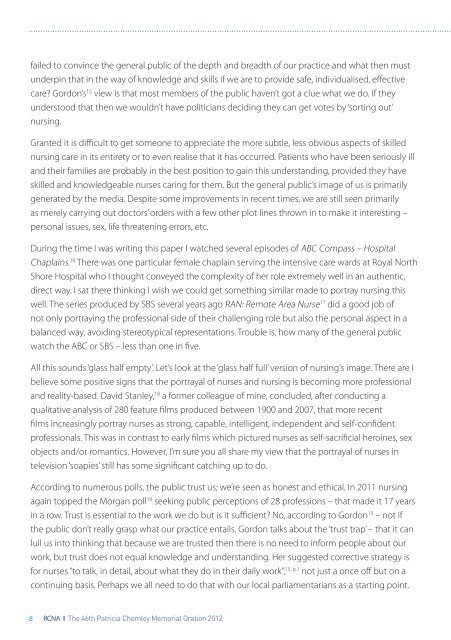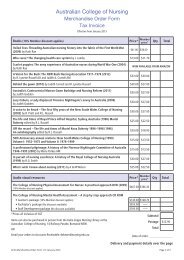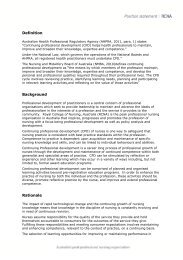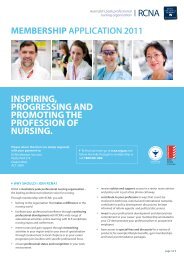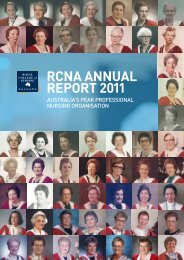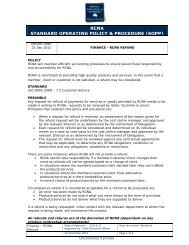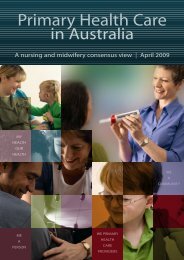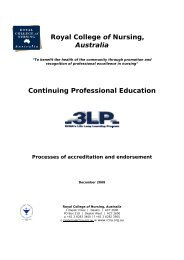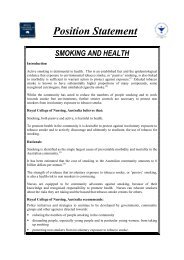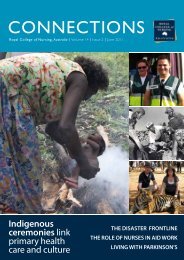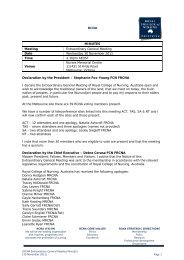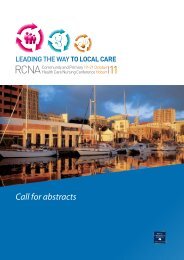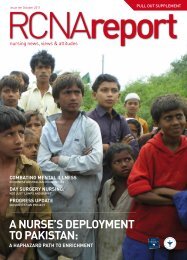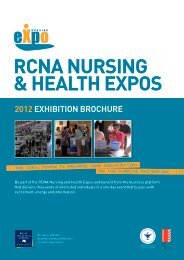the 46th patricia chomley memorial oration 2012 - Royal College of ...
the 46th patricia chomley memorial oration 2012 - Royal College of ...
the 46th patricia chomley memorial oration 2012 - Royal College of ...
You also want an ePaper? Increase the reach of your titles
YUMPU automatically turns print PDFs into web optimized ePapers that Google loves.
failed to convince <strong>the</strong> general public <strong>of</strong> <strong>the</strong> depth and breadth <strong>of</strong> our practice and what <strong>the</strong>n mustunderpin that in <strong>the</strong> way <strong>of</strong> knowledge and skills if we are to provide safe, individualised, effectivecare? Gordon’s 15 view is that most members <strong>of</strong> <strong>the</strong> public haven’t got a clue what we do. If <strong>the</strong>yunderstood that <strong>the</strong>n we wouldn’t have politicians deciding <strong>the</strong>y can get votes by ‘sorting out’nursing.Granted it is difficult to get someone to appreciate <strong>the</strong> more subtle, less obvious aspects <strong>of</strong> skillednursing care in its entirety or to even realise that it has occurred. Patients who have been seriously illand <strong>the</strong>ir families are probably in <strong>the</strong> best position to gain this understanding, provided <strong>the</strong>y haveskilled and knowledgeable nurses caring for <strong>the</strong>m. But <strong>the</strong> general public’s image <strong>of</strong> us is primarilygenerated by <strong>the</strong> media. Despite some improvements in recent times, we are still seen primarilyas merely carrying out doctors’ orders with a few o<strong>the</strong>r plot lines thrown in to make it interesting –personal issues, sex, life threatening errors, etc.During <strong>the</strong> time I was writing this paper I watched several episodes <strong>of</strong> ABC Compass – HospitalChaplains. 16 There was one particular female chaplain serving <strong>the</strong> intensive care wards at <strong>Royal</strong> NorthShore Hospital who I thought conveyed <strong>the</strong> complexity <strong>of</strong> her role extremely well in an au<strong>the</strong>ntic,direct way. I sat <strong>the</strong>re thinking I wish we could get something similar made to portray nursing thiswell. The series produced by SBS several years ago RAN: Remote Area Nurse 17 did a good job <strong>of</strong>not only portraying <strong>the</strong> pr<strong>of</strong>essional side <strong>of</strong> <strong>the</strong>ir challenging role but also <strong>the</strong> personal aspect in abalanced way, avoiding stereotypical representations. Trouble is, how many <strong>of</strong> <strong>the</strong> general publicwatch <strong>the</strong> ABC or SBS – less than one in five.All this sounds ‘glass half empty’. Let’s look at <strong>the</strong> ‘glass half full’ version <strong>of</strong> nursing‘s image. There are Ibelieve some positive signs that <strong>the</strong> portrayal <strong>of</strong> nurses and nursing is becoming more pr<strong>of</strong>essionaland reality-based. David Stanley, 18 a former colleague <strong>of</strong> mine, concluded, after conducting aqualitative analysis <strong>of</strong> 280 feature films produced between 1900 and 2007, that more recentfilms increasingly portray nurses as strong, capable, intelligent, independent and self-confidentpr<strong>of</strong>essionals. This was in contrast to early films which pictured nurses as self-sacrificial heroines, sexobjects and/or romantics. However, I’m sure you all share my view that <strong>the</strong> portrayal <strong>of</strong> nurses intelevision ‘soapies’ still has some significant catching up to do.According to numerous polls, <strong>the</strong> public trust us; we’re seen as honest and ethical. In 2011 nursingagain topped <strong>the</strong> Morgan poll 19 seeking public perceptions <strong>of</strong> 28 pr<strong>of</strong>essions – that made it 17 yearsin a row. Trust is essential to <strong>the</strong> work we do but is it sufficient? No, according to Gordon 15 – not if<strong>the</strong> public don’t really grasp what our practice entails. Gordon talks about <strong>the</strong> ‘trust trap’ – that it canlull us into thinking that because we are trusted <strong>the</strong>n <strong>the</strong>re is no need to inform people about ourwork, but trust does not equal knowledge and understanding. Her suggested corrective strategy isfor nurses “to talk, in detail, about what <strong>the</strong>y do in <strong>the</strong>ir daily work”, 15, p.1 not just a once <strong>of</strong>f but on acontinuing basis. Perhaps we all need to do that with our local parliamentarians as a starting point.8 RCNA The <strong>46th</strong> Patricia Chomley Memorial Oration <strong>2012</strong>


